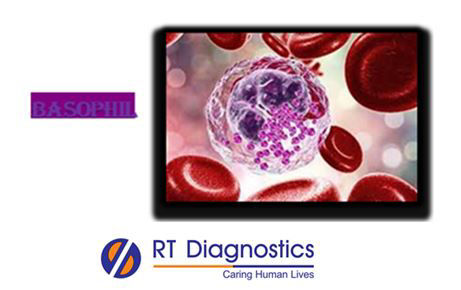ABSOLUTE BASOPHILS COUNT:
CLINICAL INFORMATION :
Basophil count can be caused by infections, severe allergies, or an overactive thyroid. The physiological role of basophils is the release of cytokines, leukotrienes, and histamine and support the immune system against pathogens such as tick and filarial worms. Basophilia is abnormally high levels of basophils, and it is a sign of chronic inflammation in the body or production of high WBCs by the bone marrow. Symptoms of basophilia are fatigue, weakness, headache, dizziness, shortness of breath, night sweats, and fever. Low levels of basophil levels are seen in severe chronic allergic reactions, hence takes a longer time duration to heal an infection. Symptoms for low basophil count include sneezing, running or stuffed nose, itchy and watery eyes, wheezing rash, hives, nausea, and vomiting. Other associated tests include flow cytometry, antibody blood test, bone marrow aspirate, bone marrow biopsy, cytogenic and molecular testing, etc.

General instructions:
Sample Requirement: Specimen - Blood sample drawn from the vein, fingertip prick for capillary blood. Test preparation: None.
NOTE - Sample for specimen collections may vary based on the patient’s condition/cases according to the patient’s presentingcomplaints / signs or symptoms:
SPECIMEN REQUIREMENT (Special or Rare Cases) - As instructed and guided by Physician / Clinician / Pathologist / as per Laboratory’s requirements, according to procedures and protocols.
This Multi-Specialty Clinical Referral Laboratory “RTDIAGNOSTICS” provides precise and accurate tests with an extensive range of testing services to the medical centers to help in the diagnosis and identification of pathology in the test specimens for infectious diseases and also to evaluate the function of organ systems of the patient. It prevents further complications and helps to stabilize and restore health to near normalcy at the earliest without delay.



